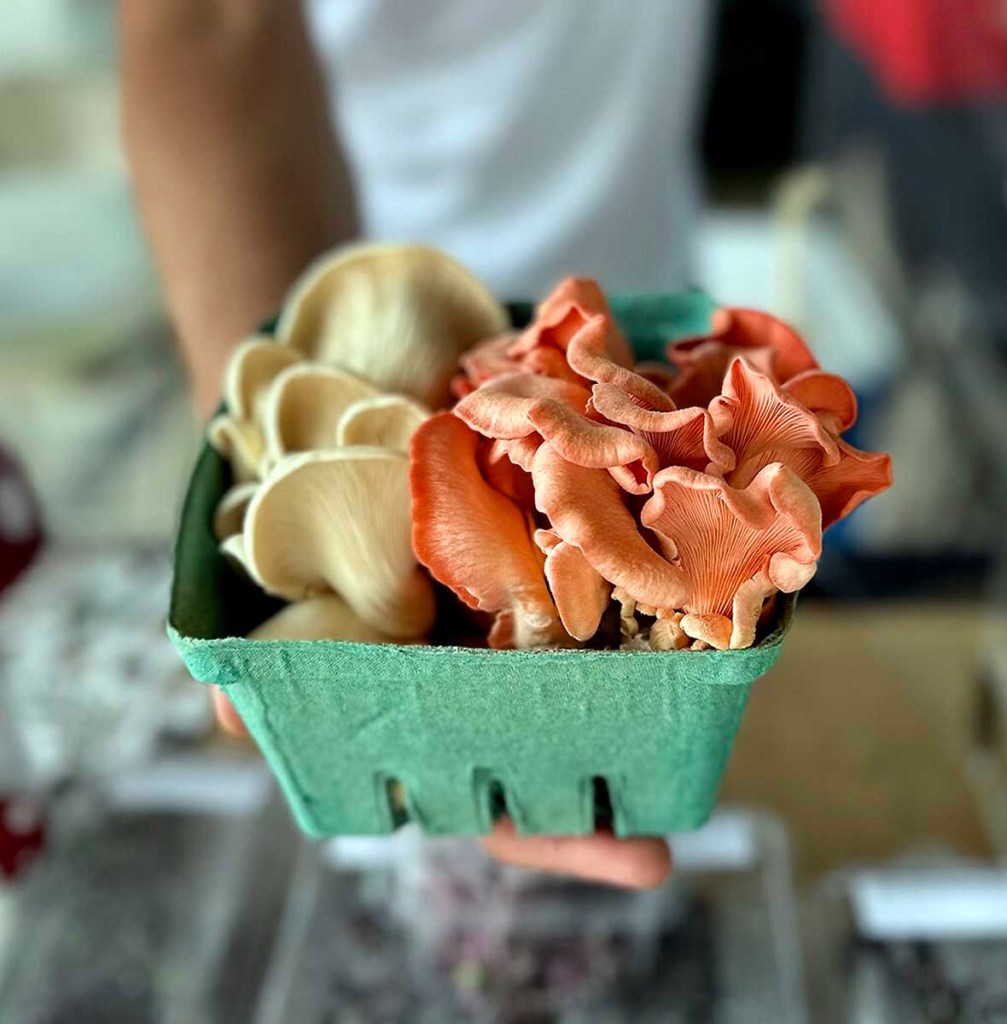A love of mushrooms led Bill Fortenberry into the fungi’s expanding specialty market
Published 1:00 am Thursday, June 15, 2023

- Bill Fortenberry shows off some of his specialty mushrooms Saturday, June 10 at the Festhalle in downtown Cullman.
For anyone who has spent any length of time in Cullman County, it would be difficult to not be at least vaguely familiar with the concept of farming and agriculture. While the thoughts of a local community focused farm might, understandably, bring to mind the area’s staple crops of strawberries, sweet potatoes, corn or beans. But Bill Fortenberry found his way into the agriculture industry well into adulthood, and the journey that lead him there was not a typical one — and neither are his crops.
Fortenberry describes the path which lead him to start growing his selection of mushrooms, which he regularly sells to both local restaurants and at the Festhalle farmer’s market under the name North Alabama Mushroom, as a “pretty wild and circuitous story.” After graduating from college he spent nearly the next three decades in the music industry as a musician, recording engineer and sales representative with worldwide retailer Sweetwater.
Trending
While working to raise the capital needed to open a vinyl pressing facility in Athens, Ga., he found work as a chef with vegetarian restaurant The Grit in Athens. “I cooked there for five years and found out how much I really loved cooking with mushrooms,” he said.
After spending years of 80-hour work weeks, he began to look for an exit strategy to leave the music industry. After making the move closer to his family in Eva, he said the COVID-19 pandemic presented an opportunity to research and develop the techniques needed to begin growing his own mushrooms. Fortenberry said the process is fairly complex, but with a little help from his father — who has a background in engineering working with NASA — he found “just enough” familiarity with science to teach himself the process through online forums and Youtube tutorials.
Fortenberry chooses to do all of his preparation and cultivation in house. Beginning by inoculating sterilized oats with mycelium, allowing it to colonize for around two weeks before transferring the grain to pasteurized sawdust blocks. Those blocks are then sealed for another two weeks before they are transferred to a fruiting chamber for yet another two weeks when mushrooms are ready to be harvested.
“Part of my week looks more like what a traditional farmer does. Most of my week, however, looks more like what a lab technician does. I’m in a mask in front of a hepa filter — very clean from a shower doing antiseptic techniques that I learned as a kid,” he said.
Fortenberry doesn’t believe this type of farming will ever replace more traditional agriculture. However, he does foresee a rising trend in the type of indoor and backyard agriculture that mushroom farming lends itself to. After all, the Agriculture Department reported that specialty mushroom sales in the 2021-2022 growing season rose 32 percent over the previous year.
“I think we are going to start seeing a lot more non-linear farms, more vertical farms and more indoor agriculture as a trend. But it’s just another component of meat producers and traditional market farmers that makes a nice accompaniment,” he said.
Trending
Fortenberry, who also holds a political science degree, said this also builds upon the vision Thomas Jefferson had for the future of the country when it was still in its infancy. He said Jefferson believed America should be a nation of small farms and agriculture. He said he believes modernizing those ideals to work into today’s society offers people a way to combat rising food costs and create a more self-sustaining population.
“I do think returning to that jeffersonian individual agriculture tradition to a degree, strengthens our country in a very fundamental way.”
Despite the weariness of mushrooms Fortenberry said he sees in some, he said the varieties he chooses offer a variety of both culinary and health benefits. Even though he continues to enjoy a fairly omnivorous diet, “I’m a true southerner, I love good barbecue and steak,’ he said mushrooms make for a perfect meat replacement and enhances the flavors of many meat dishes. He said Lions Mane mushrooms, which he cultivates, have been proven to have a slew of neurotropic properties to repair connections in the brain, which Fortenberry said could be especially beneficial to Alabama’s large elderly population.
“You can absolutely enjoy it as a culinary mushroom, but those neurotropic properties create more connections in people’s brains which allows them to live a better life. That’s really what good food is all about,” he said.
Fortenberry wants to expand his selection and offer his mushrooms to more restaurants, but he isn’t looking to “get too big.” For now, he is more than happy being able to bring a bit more variety to the patrons at Cullman’s farmers’ market and enjoy the satisfaction that can only be found at the end of a hard day’s work.
“Whether it was cooking or producing vinyl records, I’ve always enjoyed doing something that at the end of the day, I could see the results of my labor. I could see people fed. I could see food grown…I love that kind of work, I find it extremely satisfying even if I am tired a lot.”





